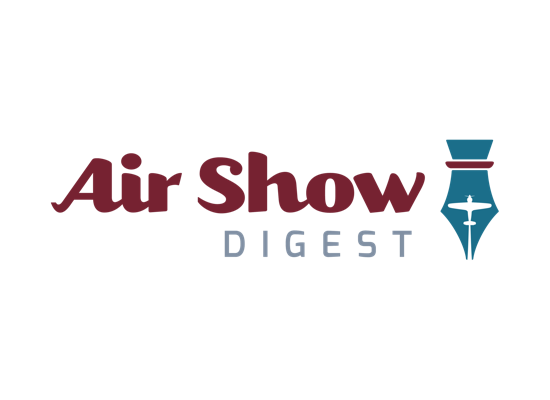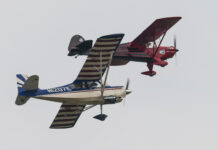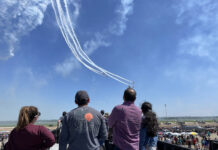It’s an understatement to say the air show industry has evolved into a mature, professional organization that provides outstanding family entertainment from one end of the continent to the other. But while entertainment has been our focus, this evolution has opened doors for many professional niche services that have become vital to our collective success. Some, such as announcing, sound systems, food and merchandise vendors are similar to those in other event industries such as auto racing, rodeos, or rock concerts. Others, such as the air boss, are unique to the industry. But each in their own way, the contributions of these niche services are becoming more and more important to the success of shows and the overall experience that fans have come to expect when they walk on the field.
Some air shows firmly believe that the three most important hiring decisions they make each year begin with the air boss, the announcer and the sound system. After all, a lame air show act is going to ruin about twelve minutes of a show. The wrong air boss, announcer or sound system can be a problem for the whole day. Once they’ve made these decisions, these event organizers turn their attention to the acts they want to hire.
Every show has to have an air boss in one form or another and good air bosses are not exactly a-dime-a-dozen. The ICAS membership list shows 20 members who list themselves as professional air bosses. Most have no trouble staying busy throughout the air show season.
Some air shows prefer to use a local pilot or committee member as their air boss and many shows get along just fine that way. Other shows have learned from bitter experience what can happen if they make the wrong selection. Schedules can unravel, conflicts can arise with the FAA monitor, and — if something goes seriously wrong — an inexperienced air boss may be unable to cope.
The Fort Worth Alliance Air Show in Texas has used a professional air boss for the past fifteen years. Special Projects Manager Christina Carrey says they not only want a professional in this role, but one who has plenty of experience. “The air boss sets the tone of the show. Once he takes the air space, he is responsible for the success and safety of what’s in the air. His experience allows him to make instantaneous decisions that impact the outcome,” she said.
The Alliance show flies over 65 aircraft from old to new and Carey says that they depend on the air boss to choreograph it so that it flows smoothly and safely. “With that many airplanes in the air, his head is on a swivel and he makes continuous adjustments. He has to think fast,” she said.
Minot Air Force Base is another show that relies on a professional air boss. “We have plenty of aviation talent here at the base that could do the job, but an air boss orchestrates the show and it becomes a safety issue,” said Deputy Open House Director Pat Travnicek. Retired from the military himself, Pat says he could probably do the job, but said if that happened he would have to give it his full attention and would have to back out of his role in the management of the show, which he doesn’t want to do.
The tiny town of Driggs, Idaho, population 1,900, saw its first air show just two years ago, produced by a land development company as part of a festival to showcase its golf course community.
Tony Snoey, general manager of Huntsman Springs, said they are concerned about safety, but said they had another reason for turning to a professional air boss. “We didn’t know anything about doing an air show and needed some professional assistance. We wanted someone who has worked in the industry and has the contacts to bring in quality performers. We also needed someone to help us with the FAA paperwork. None of us are familiar with air shows, so the decision to use a professional air boss was an easy one,” he said.
Professionals can be expensive and one of the places where shows, especially smaller shows, try to save money is in the use of non-professional announcers. They often turn to a local disk jockey or a television personality to fill this roll, and just as often pay a dear price for their selection because the individual doesn’t know anything about aviation, doesn’t know anything about the acts, and most certainly doesn’t know what to do if something bad happens.
Gena Linebarger is chairman of the CAF AIRSHO in Midland, Texas. She strongly believes the announcer’s role is to inform the audience, but engage them as well. “An experienced announcer should have the crowd hanging on his every word and should be able to hold their attention,” she said.
The CAF show is largely a warbird show, so their announcer must understand the role of each historical aircraft that participates and be able to share that with the crowd. Then there is the safety aspect of an announcer’s responsibility. “I’ve been at air shows where accidents have happened and the announcer had to take control and keep the crowd calm. A professional knows how to do that,” she said.
The Oregon International Air Show also relies on a professional announcer and, when President Judy Willey makes her hiring decisions, she looks not only at the experience of the announcer, but his ability to work well with the air boss. “The announcer and the air boss have to work side by side, and during emergencies safety is essential. If you don’t have experienced people in those roles, there could be problems,” she said.
Willey doesn’t like the idea of using local media people in the announcing role. “It is a special talent and the announcer can make or break the show.” She said another consideration is making sure the announcer will be well received by the audience. “We’ve had some difficult situations with announcers in the past and our audience has let us know about it. I learned fast that having the right announcer is important to our audience, our sponsors and our show,” she said. “Not all announcers work well in all areas of the country. You really need the right fit.”
In Redding, California, the Exchange Club has been producing air shows since 1982 and started using professional announcers in 1987. Air show chairman Bill Wagner says his show uses an announcer who has also been a performer. “The benefit to us is his range of experience doing more than a single local show. He is well familiar with the acts, which leads to better announcing and his range of announcing experience brings a lot to the table by helping us to choreograph our show,” said Wagner.
You don’t have to go to many air shows to know that air show sound system requirements are unique. Unlike rock concerts, where most professional sound system companies spend their time, air shows have a long, deep crowd line. For a long time, there were few sound systems available that met our unique needs. Those who did try to serve the air show industry used conventional horn speakers on tall stands. That’s all that was available. Now, with advanced technologies, systems are much improved. Speakers are better, and they can be widely distributed along the crowd line as well as placed behind the crowd line, using remote telemetry to transmit high quality sound.
For Judy Willey the selection of a quality sound company is near the top of her list. “I would never consider hiring someone who just does concerts. The quality of the sound system has as much impact on our audience as the announcer. I spend a lot of time interviewing people who want to provide a sound system for my show and my first requirement is having air show experience,” she said. Willey gets a full resume from each company she considers, and checks all references to find out how well they did. “Otherwise, you won’t know if there are problems until they show up and then it’s too late,” she said.
Another area where air shows are turning more and more to professionals is for their food service and souvenirs. For Christina Carrey there are several reasons for putting these services in the hands of professionals. “Several years ago, the show recruited a number of local vendors but this created a heavy workload for the committee. Now we hire a professional service and they take over. They use local service groups, provide all the food and do the necessary training. This streamlines the issues we have to manage,” she said. Carrey also noted that a professional service brings consistency to the food quality and service, which enhances the overall customer experience. “When you take into account the time we would spend recruiting and managing individual vendors, it is well worth the effort to turn to a single company who is familiar with air shows and will do a good job for us,” she said.
At the CAF’s Midland event, they take just the opposite approach. They have turned away from a professional service and rely on local vendors for their food. “We’ve hired professional concessionaires to handle our food service in the past, but we’ve gone back to local vendors because we felt like we needed to give more back to our local community,” said Linebarger.
She acknowledges it takes a lot of manpower to handle it this way, but says they have been able to recruit enough volunteers to make it work. The result has been a variety of high quality food and she said they have received a number of compliments from the community for doing it this way.
At the Hillsboro event, meanwhile, they have grown to the point that a professional food service is almost mandatory. “In the past 24 years, we have been without a professional food service concessionaire for only three years and those were not very successful,” Willey said.
Part of the problem is the size and configuration of the Hillsboro airport which requires more food booths than might be found at other shows. “For us, finding non-profit organizations and getting them to show up with enough people who have the necessary health department licenses, have the needed refrigeration space and other equipment necessary to care for the food became a nightmare,” she said.
Another advantage of using a professional service is that they take back any leftover food and souvenirs and relieve the show of the responsibility for finding a way to store or dispose of it. “If you have enough volunteers you can make it work, but for us it became a logistical challenge that we just didn’t want to deal with any more. We weren’t coming out ahead,” Willey said.
The Redding event had the same experience. The Exchange Club isn’t able to recruit enough volunteers to handle everything that must be done, especially as the show has grown. “We weren’t able to handle size of the crowds and provide enough food and drink and souvenirs. We turned everything over to a professional service and they handle everything. They use local organizations to staff their booths which gives these groups a chance to earn money and the entire community benefits,” Wagner said.
As our industry goes forward the opportunities for new niche services will continue to grow. Some will be tied to technology, such as we’ve seen with the growth of electronic ticketing companies. Others will be tied to people willing to work hard and provide a professional service, such as parking. And with each new service will come enhanced customer experiences. And that, after all, is what it’s all about.
Bonus: Air Show Outsourcing: What’s Next?
If announcers, sound system providers and air bosses are the areas of expertise on which air shows most often use contractors, there has been a recent increase in other opportunities for event organizers to outsource a portion of their workload. From marketing and ticketing to parking and air operations, many air show event organizers are finding that using an experienced and knowledgeable professional has many advantages over using internally-trained volunteers.
“This is a logical next step in the professionalization of the air show industry,” says ICAS President John Cudahy. “We have had a history and culture of volunteerism and that will remain a critical part of this business for many years to come, but it also makes sense for air show organizations to outsource responsibility for some of the most time-consuming and difficult aspects of air show operations and management.”
Herb Gillen Advertising has identified advertising and public relations for air shows as a specialty of their business. By combining the traditional strengths of a marketing agency with the specific expertise needed to be effective in the air show community, the organization is providing a service that is both very important to the success of a show and very difficult to develop internally. The agency has worked for many different air shows and air show performers and now brings a strong and current working knowledge to bear on all of the air show-related working that they do.
“The biggest thing we hear from disappointed shows that have tried using a local agency is that the air show had to spend a bunch of time teaching the agency about air shows,” says Gillen. “An agency that does this day-in and day-out has learned through trial by fire what works and what doesn’t and can often bring new ideas to shows by utilizing tactics that have been successful for them elsewhere.”
The process of selling air show admission tickets has also undergone significant changes in just the last few years. Specialty companies that help air shows sell tickets on-line are in the process of making more traditional ticket sales methods obsolete. As the public has become more comfortable with buying goods and services on the internet, the efficiencies of web-based admissions ticket sales have completely changed traditional perspectives on how tickets are distributed, sold and accounted for. For nearly a decade, John Haak and his team at ExtremeTix/ClicknPrint have been promoting the advantages and opportunities of on-line ticketing. More recently, other electronic ticketing companies have become involved in the air show community, including AttendStar.com, Eventbrite, In Ticketing, and TicketDerby.
Consultants who help solve traffic and parking challenges have also started to become more common in the air show industry. Spectators and, especially, prospective spectators have identified traffic and parking problems as the single most pressing problem facing event organizers. In response to both the size and importance of this challenge, many event organizers have opted to stop looking for solutions from within their organization and turn to professionals who solve parking problems for a living.
At the Fort Worth Alliance Air Show, event organizers opted to hire a specialty company to manage everything related to their parking operations. George Westby and his company, Quick Park, have been providing traffic planning and parking management services to the Alliance air show for five years. “Parking is a major task and if not handled properly, it can make or break a show from the guests’ first impression of your event and their experience straight to your bottom line,” said Christina Carey from the Alliance show. “It was one less area we had to coordinate and definitely worth the money we spent.”
“Outside contractors have a broader scope of knowledge from their experience with multiple events,” says Jeff Shapiro of Solutions Event Services in Long Beach, New York, whose company also specializes in helping air shows to find practical, workable traffic and parking solutions. “Contractors bring this experience and expertise plus techniques that worked at other events. They are in a much better position to challenge – and improve — the status quo.”
In some cases, an air show turns to outside help because nobody within the organization has the requisite experience or knowledge to run an air show. Mike McCabe and his team at AirSupport provide operations-oriented services for air shows that have interest in a show, but not the expertise to organize and conduct one. Established more than 15 years ago for the purposes of providing operations and logistical support to air shows, AirSupport encourages the show organizers to look over their shoulders as they plan and run the show. Then, after a couple of years, the local show organizers become familiar enough with how to do things that they can do it themselves.
“One of our principle benefits is our collaborative approach,” says McCabe. “We work to help the local event develop their expertise while at that same time bringing with us a wealth of knowledge and experience that allows them to ‘leap frog’ the learning curve and operate a safer, more enjoyable and profitable event than if they just started on their own.”
There are even contract “volunteers” starting to pop up here and there. Barb Long is an industry veteran that has volunteered within the air show community at many shows and in many different capacities. Recently, she suggested to a couple of events that they hire her during the last several weeks to handle those kinds of planning and preparations tasks that they would normally give to a volunteer. The show pays her and finds her a place to stay. In return, the event gets a very experienced person who knows how to plan a party, interact with the FAA and solve problems with hotels and car rental companies.
The trend toward outsourcing in the air show community is more evolutionary than revolutionary. There has not been – and there is not likely to be – a mass migration away from the volunteer model that has driven the business for most of the last 100 years. But, as part of the continuing effort to identify more effective and efficient ways to conduct their businesses, air show event organizers are finding that – in some situations – contractors represent a better way to tackle some of the specific tasks, problems and challenges associated with organizing and conducting an air show. And as that evolution continues, it’s likely that more and more contractors will become involved in areas of the business that had previously been managed by employees or volunteers.








